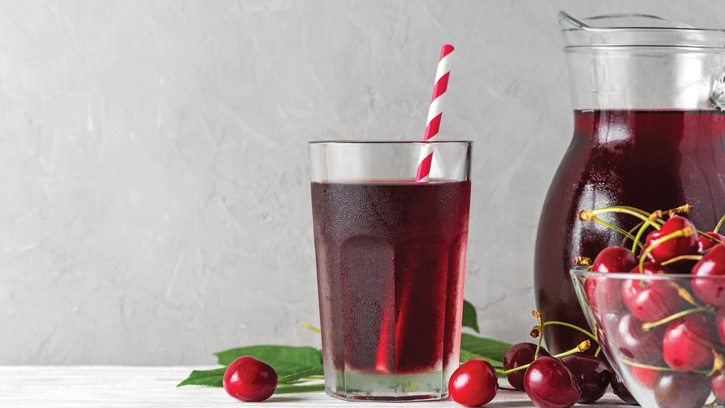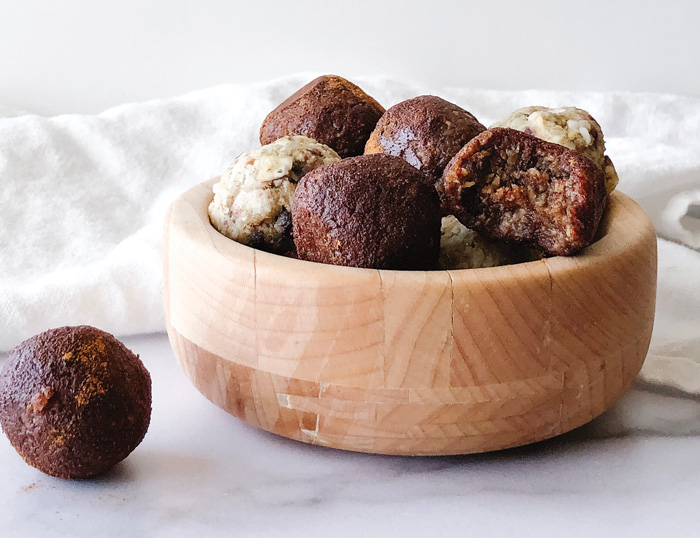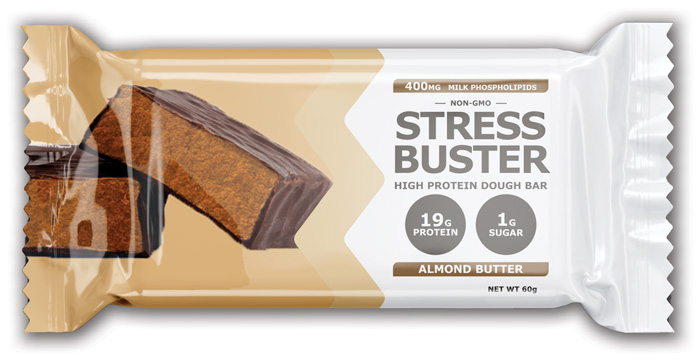Ingredients for Stressing Less, Sleeping Better
NUTRACEUTICALS
Reducing stress and improving sleep are related goals for many of us, particularly in the past year. The American Psychological Association’s latest Stress in America poll revealed that one year after the start of the global pandemic, many adults reported undesired weight changes, increased drinking, and other negative behaviors that may be related to an inability to cope with prolonged stress. In addition, two in three Americans (67%) said they are sleeping more or less than they wanted to since the pandemic started.
A growing number of sleep aids, supplements, and unique foods and beverages target people’s desire to relax and sleep better. PepsiCo’s Driftwell, for example, is an enhanced water that contains L-theanine, which has been shown to help promote relaxation. Evening Chill chocolate protein clusters from Good Source Foods are formulated with dried cherries, which contain melatonin, and lavender, which is associated with calmness.
Here is a look at some ingredients that are believed to help with sleep and relaxation.
Melatonin
A hormone commonly used as a dietary supplement for improving sleep, melatonin helps regulate the body’s circadian rhythm and sleep-wake cycles.
In a recent meta-analysis of 23 randomized controlled trials, Fatemeh et al. (2021) found that treatment with melatonin had positive effects on sleep quality in adults with respiratory diseases, metabolic disorders, and primary sleep disorders. Xu et al. (2020) showed that melatonin supplementation over a four-week period was effective and safe in improving some aspects of objective sleep quality, such as total sleep time, percentage of rapid eye movement, and early morning wake time in middle-aged patients with insomnia. Subjects were randomized to receive 3 mg fast-release melatonin or placebo daily 1 hr before bedtime.
Magnesium
Magnesium is important for many processes in the body, including regulating muscle and nerve function. Because it is involved in so many processes, magnesium has been linked to potentially benefiting stress and sleep. It is thought to help activate neurotransmitters that are responsible for calming the body and the mind.
Pickering et al. (2020) discussed the relationship between magnesium and stress, explaining that numerous studies have demonstrated that magnesium plays an inhibitory key role in the regulation and neurotransmission of the normal stress response. In addition, low magnesium status has been reported in several studies assessing nutritional aspects in subjects suffering from psychological stress or associated symptoms. “This overlap in the results suggests that stress could increase magnesium loss, causing a deficiency; and in turn, magnesium deficiency could enhance the body’s susceptibility to stress, resulting in a magnesium and stress vicious circle,” the authors stated.
Djokic et al. (2019) indicated that 3 mo of a magnesium-melatonin-vitamin B complex supplementation had a beneficial effect in the treatment of insomnia; the test group received the supplement once daily, 1 hr before sleep.
Tart Cherries
Research supports the antioxidant content and anti-inflammatory benefits of tart cherries. Tart cherry juice also contains melatonin, making it a popular natural remedy for sleep.
Samara et al. (2020) reviewed several potential treatments for insomnia and concluded that tart cherry juice was effective in improving total sleep time and sleep quality among those 65 years and older. Fifty-three randomized controlled trials with 6,832 participants (75 years old on average) were included, 43 of which examined the efficacy of one or more drugs. The limited evidence on non-pharmacological interventions suggested that acupressure, auricular acupuncture, a mindfulness-based stress reduction program, and tart cherry juice were more effective than the control interventions.
Botanicals
Like tart cherries, botanicals offer potential natural remedies for relaxation and better sleep. Langade et al. (2021) showed that ashwagandha root extract can improve sleep quality and can help in managing insomnia. In both healthy subjects and those with insomnia, there was a significant improvement in the sleep parameters (improved sleep onset latency, sleep quality) in the ashwagandha root extract–supplemented group. The improvement was more significant in subjects with insomnia than with healthy subjects.
DailyZz from Kemin Industries is a naturally sourced proprietary botanical blend of sleep-promoting polyphenols. Tubbs et al. (2021) indicated that the polyphenol blend may be useful for improving certain aspects of sleep and may even improve some elements of neurocognitive functioning over placebo. At the end of the 30-day study, participants who received 485 milligrams of DailyZz containing at least 120 mg of sleep-promoting polyphenols (and at least 65 mg rosmarinic acid and epigallocatechin gallate), 30 min before bed every night, reported improved sleep quality and reduced insomnia severity index scores compared with the control group. In addition, the polyphenol blend group showed improvement in some elements of neurocognitive functioning, including vigilant attention, working memory, and risk assessment.
L-Theanine
L-theanine is an amino acid naturally found in tea leaves. It is a common ingredient in products that promote relaxation. Studies have shown that L-theanine stimulates alpha wave activity in the brain, creating a relaxed state.
Suntheanine from Taiyo International is not an extract of green tea, but is produced via a patented process that mimics the natural process in green tea leaves, resulting in a 100% pure L-isomer-theanine. Clinical research suggests that Suntheanine can promote relaxation without drowsiness. Hidese et al. (2019) demonstrated stress-related symptoms decreased while cognitive function improved following four weeks of Suntheanine (200 mg/day) supplementation in a healthy population.
Dairy Derivatives
Naturally present in milk, milk phospholipids are complex lipids that have been shown to help manage the effects of stress. “Milk phospholipids show benefits for stress through a variety of potential mechanisms. One of these is the impact it has on the primary stress hormone cortisol, blunting its release and modulating its availability, which has been termed ‘stress buffering’ within some research,” explains Aaron Fanning, science manager, nutrition, Fonterra R&D Center.
Fanning adds that phospholipids have impacts across the body. “Some of these impacts may improve cognitive responses, from improving neurotransmitter, to providing substrate for brain cell metabolism, through to having an anti-inflammatory effect that may help reduce inflammation associated with stress,” he says.
Boyle et al. (2019) demonstrated that dietary intake of milk phospholipids benefited cognitive performance under conditions of psychosocial stress. Phospholipid intake improved post-stress reaction time performance on an attention-switching task and significantly increased mid-stress induction energetic arousal.
A hydrolyzed milk protein, Lactium from Ingredia has been shown to help with stress and sleep quality. The refined alpha-s1 casein hydrolysate increases the activity of gamma-aminobutyric acid, a neurotransmitter known for its inhibitory action on anxiety and its relaxing properties. Kim et al. (2019) demonstrated that Lactium was well tolerated and could improve sleep quality, with possible cumulative beneficial effects with long-term administration. This study included 48 participants who exhibited a mild to moderate degree of sleep disturbance. Overall perceived sleep profiles in sleep diaries were significantly improved while taking Lactium, represented by increased total sleep time and sleep efficiency, as well as decreased sleep latency and wake after sleep onset.
Prebiotics and Probiotics
Research is increasingly focusing on the relationship between the microbiome and overall health, including stress. Taylor and Holscher (2020) summarized findings from clinical studies using dietary intervention to improve depression, anxiety, or stress and the role the gastrointestinal microbiota may have in these disorders. They found that mood was improved by enhancing diet quality. In particular, fructooligosaccharide and galactooligosaccharide improved anxiety and depression in participants consuming ≥ 5 g/day. Additionally, bifidobacteria were enriched in subjects consuming ≥ 5 g/day. Probiotic consumption improved psychological or biological measures of depression, anxiety, or stress in individuals predisposed to a mood disorder. Probiotics suppressed biological markers of stress in healthy individuals in a strain-dependent manner.
Last year, Friesland Campina Ingredients launched a beverage concept, Biotis SleepWell, which contains its Biotis GOS (galactooligosaccharide). Designed to be taken just before bedtime, it is a convenient beverage, shot, or powder application that provides the body with a combination of nutrients to improve three aspects of sleep quality: falling asleep, sleeping through the night, and waking up refreshed. The concept’s unique formulation combines the galactooligosaccharide with protein-containing amino acids, such as tryptophan and cysteine, derived from milk protein, as well as complementary vitamins and minerals. This well-balanced solution targets several sleep and stress mechanisms at once.
With an increasing number of ingredients available and continued research into their functionalities, consumers can look forward to more products designed to help them achieve better sleep, better relaxation, and less stress in their lives.
REFERENCES
American Psychological Assoc. 2021. “One Year On: Unhealthy Weight Gains, Increased Drinking Reported by Americans Coping with Pandemic Stress.” Press release, March 11. American Psychological Assoc., Washington, D.C. apa.org.
Boyle, N. B., L. Dye, K. Arkbåge, et al. 2019. “Effects of Milk-Based Phospholipids on Cognitive Performance and Subjective Responses to Psychosocial Stress: A Randomized, Double-Blind, Placebo-Controlled Trial in High-Perfectionist Men.” Nutrition 57: 183-193.
Djokic, G., P. Vojvodic´, D. Korcok, et al. 2019. “The Effects of Magnesium-Melatonin-Vit B Complex Supplementation in Treatment of Insomnia.” Open Access Maced J Med Sci. 7(18): 3101–3105.
Fatemeh, G., M. Sajjad, R. Niloufar, et al. 2021. “Effect of Melatonin Supplementation on Sleep Quality: A Systematic Review and Meta-Analysis of Randomized Controlled Trials.” J. Neurol. Online ahead of print. doi: 10.1007/s00415-020-10381-w.
Hidese, S. S. Ogawa, M. Ota, et al. 2019. “Effects of L-Theanine Administration on Stress-Related Symptoms and Cognitive Functions in Healthy Adults: A Randomized Controlled Trial.” Nutrients 11(10): 2362.
Kim, H. J., J. Kim, S. Lee, et al. 2019. “A Double-Blind, Randomized, Placebo-Controlled Crossover Clinical Study of the Effects of Alpha-s1 Casein Hydrolysate on Sleep Disturbance.” Nutrients 11(7): 1466.
Langade, D., V. Thakare, S. Kanchi, et al. 2021. “Clinical Evaluation of the Pharmacological Impact of Ashwagandha Root Extract on Sleep in Healthy Volunteers and Insomnia Patients: A Double-blind, Randomized, Parallel-group, Placebo-controlled Study.” J. Ethnopharmacology 264: 113276.
Pickering, G., A. Mazur, M. Trousselard, et al. 2020. “Magnesium Status and Stress: The Vicious Circle Concept Revisited.” Nutrients 12(12): 3672.
Samara, M. T., M. Huhn, V. Chiocchia, et al. 2020. “Efficacy, Acceptability, and Tolerability of All Available Treatments for Insomnia in the Elderly: A Systematic Review and Network Meta-Analysis.” Acta Psychiatrica Scandinavia. 142(1): 6–17.
Taylor, A. M., and H. D. Holscher. 2020. “A Review of Dietary and Microbial Connections to Depression, Anxiety, and Stress.” Nutr. Neurosci. 23(3): 237–250.
Tubbs, A. S., K. E. R. Kennedy, P. Alfonso-Miller, et al. 2021. “A Randomized, Double-Blind, Placebo-Controlled Trial of a Polyphenol Botanical Blend on Sleep and Daytime Functioning.” Int. J. Environ. Res. Public Health 18: 3044.
Xu, H., C. Zhang, Y. Qian, et al. 2020. “Efficacy of Melatonin for Sleep Disturbance in Middle-aged Primary Insomnia: A Double-blind, Randomised Clinical Trial.” Sleep Med. 76: 113–119.








